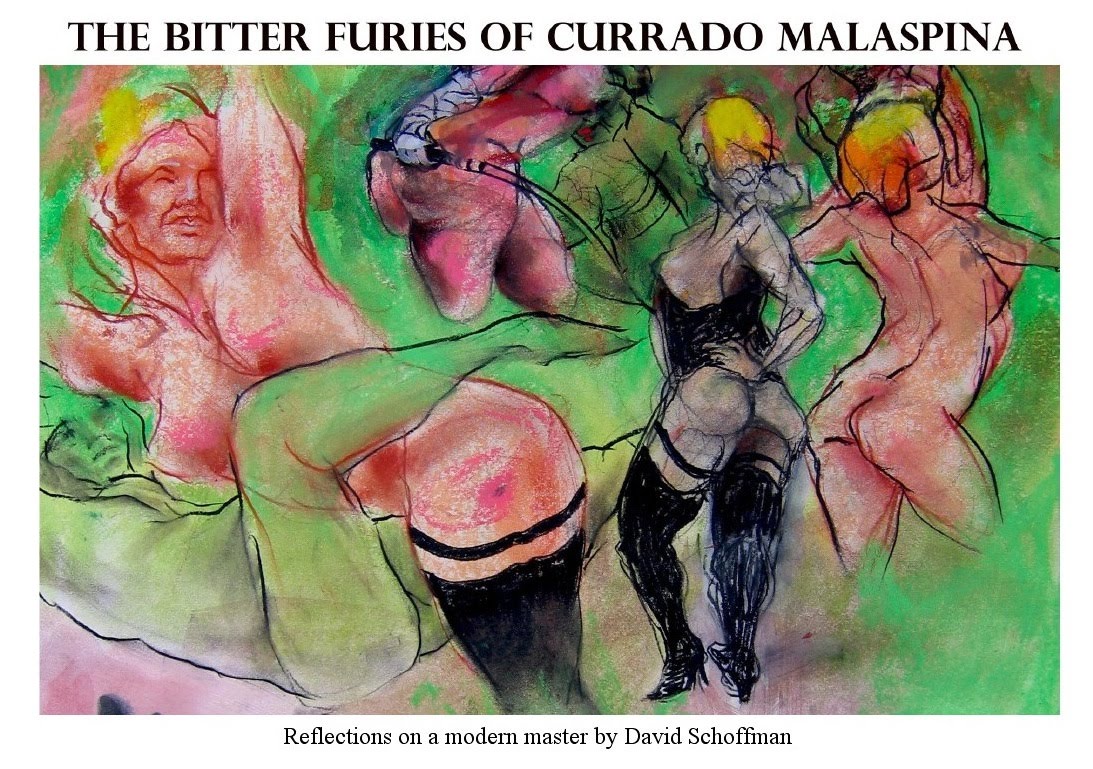skip to main |
skip to sidebar
 Sharp flashes of lucid observation fill the brilliant pages of Beauty Fails, Currado Malspina’s 2002 anthology of notes, dreams and jeremiads. Originally published by Palmira Press, it is Malaspina’s first prose work in English. His rough knuckled illustrations fan across each page creating the faint impression of an illuminated book of hours. In fact, one short essay in which he describes a restless longing for an estranged colleague’s alluring young wife is entitled O Intemerata.It is endlessly rewarding, charting the dingy grottos of Currado’s tactless imagination. Connolly Rothschild famously described Beauty Fails as “a libertine primer on liberty” and assigned it each year to his creative writing students at Yale.Rothschild’s sudden demission from the English department may have been the result of a rising tide of censorious priggishness but no one in New Haven is talking.
Sharp flashes of lucid observation fill the brilliant pages of Beauty Fails, Currado Malspina’s 2002 anthology of notes, dreams and jeremiads. Originally published by Palmira Press, it is Malaspina’s first prose work in English. His rough knuckled illustrations fan across each page creating the faint impression of an illuminated book of hours. In fact, one short essay in which he describes a restless longing for an estranged colleague’s alluring young wife is entitled O Intemerata.It is endlessly rewarding, charting the dingy grottos of Currado’s tactless imagination. Connolly Rothschild famously described Beauty Fails as “a libertine primer on liberty” and assigned it each year to his creative writing students at Yale.Rothschild’s sudden demission from the English department may have been the result of a rising tide of censorious priggishness but no one in New Haven is talking.
 Weather has always played a big part in the mercurial behavior of Currado Malaspina. Curiously, his mood turns darker as the sun shines brighter – summer being his worst season. As Parisian women shed raiments like serpents shedding skins, the streets become what Currado likes to call “un carnaval de décolletage.” And yet, to a man whose world is illuminated by the lamp, climate has its own peculiar consequence.As a child, Malaspina would spend the month of August with an invalided aunt in the tiny village of Agnac in Lot-et Garonne. The Aquitaine can be a magical place for a child with its lush plum orchards and mysterious chateaux. For young Currado it was an annual agony.Small for his age, the local children would subject him to wildly imaginative torments and unspeakable abuse. Ever since, heat and pain have been linked in Currado’s mind.Young Malaspina took solace in sketching and many examples of his juvenilia are still extant. The Dordogne Museum of Contemporary Art recently staged an exhibition in honor of Currado’s sixty-fifth birthday and in it were several of these very early drawings.One of Currado’s erstwhile tormentors is the eminent art critic, Raoul Contout who, in reviewing the show in Paris Match recalled their early summers, quipping, “the short child grew into the large man of elephantine ego and slight achievement.”Children can be so cruel.
Weather has always played a big part in the mercurial behavior of Currado Malaspina. Curiously, his mood turns darker as the sun shines brighter – summer being his worst season. As Parisian women shed raiments like serpents shedding skins, the streets become what Currado likes to call “un carnaval de décolletage.” And yet, to a man whose world is illuminated by the lamp, climate has its own peculiar consequence.As a child, Malaspina would spend the month of August with an invalided aunt in the tiny village of Agnac in Lot-et Garonne. The Aquitaine can be a magical place for a child with its lush plum orchards and mysterious chateaux. For young Currado it was an annual agony.Small for his age, the local children would subject him to wildly imaginative torments and unspeakable abuse. Ever since, heat and pain have been linked in Currado’s mind.Young Malaspina took solace in sketching and many examples of his juvenilia are still extant. The Dordogne Museum of Contemporary Art recently staged an exhibition in honor of Currado’s sixty-fifth birthday and in it were several of these very early drawings.One of Currado’s erstwhile tormentors is the eminent art critic, Raoul Contout who, in reviewing the show in Paris Match recalled their early summers, quipping, “the short child grew into the large man of elephantine ego and slight achievement.”Children can be so cruel.
 Although there were neither witnesses nor any known record or transcript, there is no shortage of speculation regarding the legendary four-hour walk Currado Malaspina took with the Italian psychoanalyst E. Barba Giovedi.
Although there were neither witnesses nor any known record or transcript, there is no shortage of speculation regarding the legendary four-hour walk Currado Malaspina took with the Italian psychoanalyst E. Barba Giovedi.
Malaspina puzzled for many years over the nature of his work and its putative relationship to his personal history. He struggled for years with his despairing pessimism and often wondered if his dark disposition was necessary for his creativity. As a lifelong serial philanderer, he wrestled with his conscience and his oppressive remorse. As a pasticheur of other people’s ideas he was pained by his unexceptionalism despite his early promise.
In short, he was a shell, a ruin, an empty vessel masquerading as a genius for the benefit of a credulous and adoring public.
I will not add to the unsubstantiated rumors but I will simply note that after that famed meeting, Currado produced the series of monotypes that have justly earned him a sacred place in the annals of contemporary French art history.
He has since replaced his old neuroses with new, more eccentric ones and has no intention of addressing them clinically.
 Of all the illustrated editions of the Divine Comedy that I have come across, the one closest to my heart is Currado Malaspina's Beatrice In Bed.
Of all the illustrated editions of the Divine Comedy that I have come across, the one closest to my heart is Currado Malaspina's Beatrice In Bed.
His clumsy, irreverent drawings of Dante's beloved are so raunchy, so unbecoming of their original intent, so flagrantly personal that I am drawn to them with embarrassment. They bear no balm of refinement, their fallible formlessness are in stark contrast to the relentless musicality of the poem’s terza rima. Vinegary pigment, inelegant brushstrokes and text scrawled as if by the beak of a marsh cock crowd his sheets in a panic of dissonant misbehavior.
But beneath the work’s gassy astringencies there is a ripe, affirming tenderness that parallels the poet’s own grueling transformation. Few artists have been able to capture so vividly the Commedia’s imperium of uncertainty and incomplete redemption.
It's a pity that the book is out of print.
 Currado Malaspina once told me that during the course of a lifetime, a man can expect his soul to bend four times: Once in doubt, once in anticipation, once in despair and once in agony.
Currado Malaspina once told me that during the course of a lifetime, a man can expect his soul to bend four times: Once in doubt, once in anticipation, once in despair and once in agony.
The longest period is despair.
Life, he told me, is like the narrow bones of the fingers, incessantly in motion and perpetually at risk. To plan and to wager are one. Even our most subtle utterances are but the guttural hackings of a beast.
His favorite poem is Yuntas by César Vallejo.
Completamente. Además, mundo!
Completamente. Además, polvo!
Completely, Furthermore, world!
Completely, Furthermore, dust!
And yet, as I write this, construction proceeds with the methodical urgency only a narcissist could be capable of. In the Normandy village of St Germain sur Ay, a 5000 square foot, beachfront studio complex, complete with an intaglio workshop, two darkrooms, an editing facility and a skylit painting atelier is being built for the pessimistic Malaspina.
I suppose despair has been good for business.
NO LIQUOR STRONGER
 “Sewn through the fabric of friendship are the inevitable threads of inconsolable loss.” So wrote Tuhija Repo, Finland’s infamous poète maudit. He goes on to write in his famous essay “The New Magnetic Fields,” that, “intimacy is to betrayal as scotch is to bourbon. Like the belted kingfisher whose predatory rattle signals life and death in one loud cry, we smugly roar through life’s uncertainties, using the language of conviction to express the hesitant disquiet of irreconcilable doubt.”
“Sewn through the fabric of friendship are the inevitable threads of inconsolable loss.” So wrote Tuhija Repo, Finland’s infamous poète maudit. He goes on to write in his famous essay “The New Magnetic Fields,” that, “intimacy is to betrayal as scotch is to bourbon. Like the belted kingfisher whose predatory rattle signals life and death in one loud cry, we smugly roar through life’s uncertainties, using the language of conviction to express the hesitant disquiet of irreconcilable doubt.”
Repo’s words come to mind as I ruminate upon the current state of my kinship with Currado Malaspina. My love for him has made me vulnerable to his fickle conceits. And yet, he stands alone as my equal and to lose him would mean the loss of my only true interlocutor.
Homo homini lupus perhaps sums it all up, however glibly. Freud, in “Civilization and its Discontents” observed that, "It is always possible to bind together a considerable number of people in love, so long as there are other people left over to receive the manifestations of their aggressiveness.”
In Currado Malaspina, I have found both needs bundled into one onerous receptacle.
Je suis coupable.







